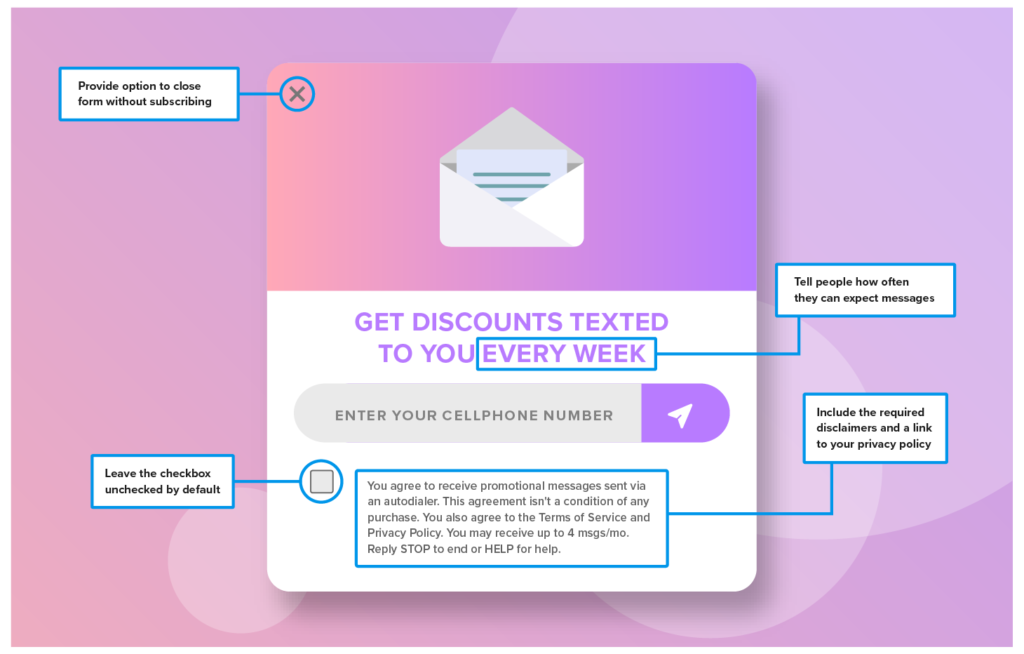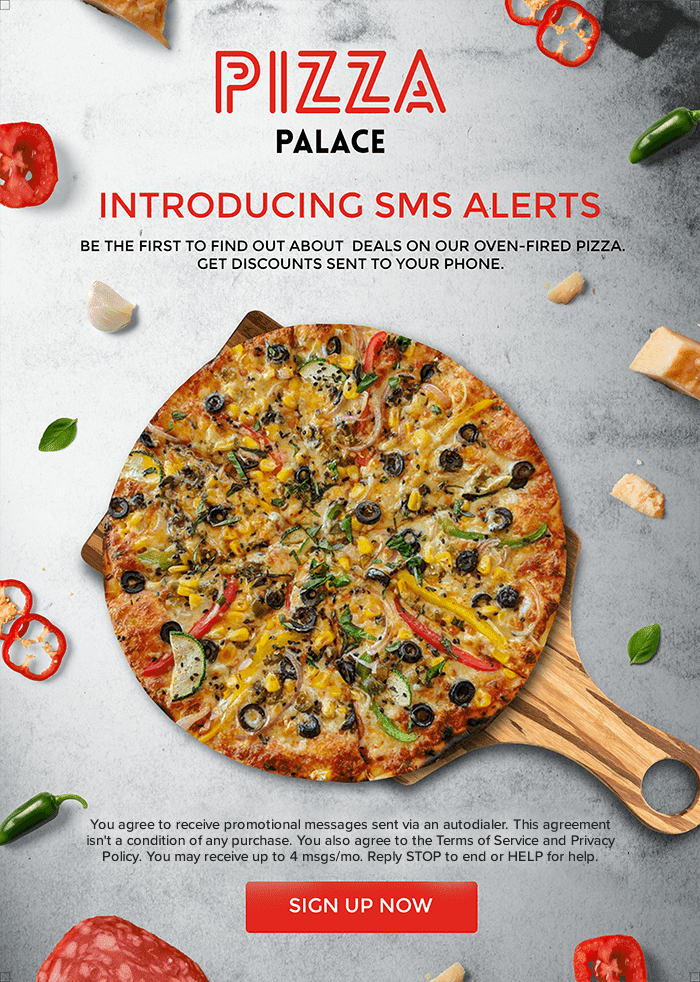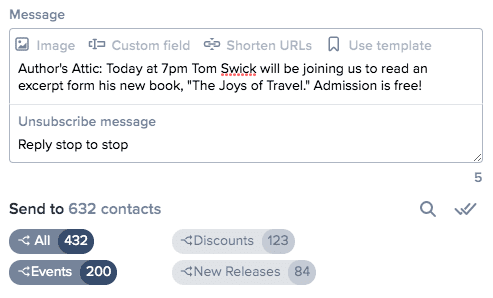5 tips to keep your unsubscribe rate as low as possible
It happens. Sometimes people unsubscribe from your messages. The good news is there's plenty you can do to make sure you keep as many contacts as possible.

It happens. Sometimes people unsubscribe from your messages. The good news is there's plenty you can do to make sure you keep as many contacts as possible.

Would you like to increase profits by 70%? You probably just said “duh” or “what’s the catch” in your head. Well, it’s totally possible, and there is no catch.
There’s a secret weapon you can use, it’s called customer retention. By the numbers, if you can boost your customer retention by as little as 5%, it’s possible to increase profits by 25% to 95%.
To get customers to stick around, you need to communicate with them regularly. So how do you keep them from texting that dreaded four-letter word: STOP?
But first you may be wondering, what is a good unsubscribe rate?
This varies by industry, but we recommend that our customers keep their unsubscribe rate less than 3% per text campaign. Anything more and you may not be following compliance rules.
And with that, let’s jump in and talk about how to prevent opt outs in your SMS marketing. Follow these five tips and you’re sure to lower your SMS opt-out rate.
Never force people to sign up for your messages. Not only is this bad practice, it’s against regulatory guidelines. For example, a site should never say “Enter your number to continue.”
If you collect numbers using a web form, include a checkbox that visitors must click to confirm they want to receive text messages. Always have this box unchecked by default.

Double opt-in is simply the process of confirming that new contacts want to receive your texts, even if they’ve already signed up through a web form, keyword, or other primary opt-in.
Although it might seem like a lot of effort to get a “yes” from people who’ve already opted in, trust us. People who are double-sure they want to get your texts are people who won’t quickly unsubscribe.
Not only that, but you can also avoid keeping contacts who subscribed accidentally. Double opt-in is a great way to keep your text marketing bases covered.
Imagine this scenario. You’re placing an order online and are asked for your number. You enter it, expecting to be contacted if there are any issues.
Then, you suddenly get a promotional coupon from the company. You’d probably unsubscribe, right?
That’s why it’s important to make it as clear as possible to people that they’re signing up for a marketing list before they enter their number on your website, text in your keyword, or fill out your paper form.
Here’s a good example of a CTA. Notice the way it states very clearly what you’ll get when you sign up.

In short, no one should be surprised when they receive a promotional text from you.
It’s important, too, to balance the compliance-oriented language in your opt-in with the value it offers.
While “Give us your info to get coupons” is accurate, it’s also boring and robotic.
Instead, try something like, “Share your phone number to receive personalized tips and exclusive discounts every month.”
Remember–you want your contacts to look forward to your messages.
You can use autoresponders to set up an automated welcome message that sends immediately after someone subscribes.
Use this as another opportunity to set expectations. Tell your contacts what they’ll be receiving and get them excited to be a member of your list.
Need more inspiration?
Before you send a campaign, ask yourself, “Would I talk like this to a friend?” If the answer is no, you should probably tweak your message.
For example, imagine you got a text that says, “FLASH SALE: 20% off massages at Serenity Spa. Must call us today to make an appointment.”
You probably wouldn’t reply. It sounds pretty spammy, right? But imagine if it sounded more like this:
Bet that massage sounds a lot more appealing. The text still includes a discount. It still has a sense of urgency, too.
Notice the way it includes the customer’s first name. This is easy to do using our custom fields feature.
Also, take note of the fact that it includes a question and includes the pronoun “I”. These two subtle techniques can go a long way in increasing response rates and reducing unsubscribes.
You wouldn’t want to reply STOP to someone who politely asked if you’d like to take advantage of a limited-time offer.
Let’s take some wisdom from the world of email marketing. A survey from Constant Contact found that the second most common reason people unsubscribe from messages is that they feel the content was irrelevant to them.
One solution is to segment your audience. This allows you to deliver content that’s more customized, relevant, and helpful to your contacts.
Here’s one way of doing it. We’ll pretend we run a bookstore called the Author’s Attic. We’ll ask people to text “Authors” to 833-301-1234 to sign up for our text club.
To segment our list, we can create a custom field and call it “interest.”

Next, we can set up data collection using the keyword. Here’s a step-by-step article on how to do it. Basically, when someone texts in “Authors,” they’ll receive a question:
Now all we have to do is create four segments based on these options. To create a segment, go to the Contacts panel, click “Segments,” “New Segment,” and set up the conditions.

If we have an upcoming event, for example, we can send it out to just the people who replied “All” and “Events.”

With your list organized into segments, customers only get texts they care about. As a result, they are far less likely to unsubscribe. The better the segments, the fewer people will text “STOP.”
It’s important to spend time growing your list of contacts. There are plenty of opt-in methods your organization can take advantage of.
It’s equally (if not more) important to keep your current contacts engaged and excited to get your texts.
Try these five techniques and let us know how it goes. We’d love to hear about it on LinkedIn and Facebook.
Alfredo is SimpleTexting's brand manager. He's passionate about using his 10+ years of marketing experience to help small businesses grow.
More Posts from Alfredo SalkeldText marketing has proven time and time again to be an effective channel. Here’s how text giveaways can help grow your SMS subscriber list.
ReadConvert your existing email contacts into SMS subscribers with these four customizable email templates you can copy and paste.
ReadStart a text marketing campaign or have a 1-on-1 conversation today. It's risk free. Sign up for a free 14-day trial today to see SimpleTexting in action.
No credit card required